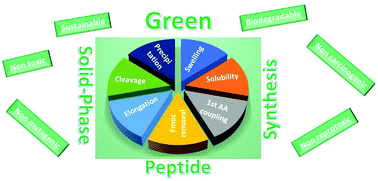Greening Fmoc/tBu solid-phase peptide synthesis
Abstract
Peptides are gaining considerable attention as potential drugs. The so-called Fmoc/tBu solid-phase synthesis is the method of choice for the synthesis of these molecules in both research and industrial settings. This synthetic strategy involves a solid polymeric protecting group and allows the use of an excess of reagents to achieve quantitative yields. Intermediates are not isolated. However, extensive washing with solvents is carried out between the synthetic steps. Hazardous solvents, mainly DMF, NMP, and CH2Cl2, are currently being used for the chemical reactions and also for the washings. In recent years, several studies have proposed the use of greener solvents in solid-phase peptide synthesis (SPPS). Here we compile all the greening efforts done in this regard and analyze each synthetic step separately. In summary, we can conclude that in many cases green solvents do not impair the synthetic process and that their adoption in current synthetic schemes will be translated into a smaller impact on the environment and on human health.



 Please wait while we load your content...
Please wait while we load your content...